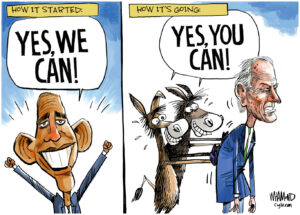Obama Campaigners Work the Switchboards
If the Illinois senator beats Hillary Clinton and the others for the nomination, a good portion of credit will go to the volunteers now making phone calls in Iowa, New Hampshire, South Carolina, California and other places.
If Barack Obama beats Hillary Clinton and the others for the Democratic presidential nomination, a good portion of credit will go to the volunteers now making phone calls in Iowa, New Hampshire, South Carolina, California and other places along the campaign trail.
Such a volunteer effort seems old-fashioned, a leftover from the 1960s and ’70s. The speed of the Internet, the power of bloggers and the constant presence of 24-hour television news are supposed to determine elections today. The judgment of the media horde at a televised debate is considered more important than volunteers in a Los Angeles suburb.
If such judgments were the only measure of a campaign’s success, last weekend would have been grim for Obama. The horde panned him for his performance Thursday night at the Las Vegas Democratic debate. Clinton, ridiculed the week before, was reborn as the star. Such media judgments are fed by the polls. Pollster.com’s compilation of surveys has Clinton leading nationally at 44 percent compared with Obama’s 22 percent. In New Hampshire, where the primary will be held Jan. 8, Clinton is leading Obama 34 percent to 24 percent, with John Edwards receiving 15 percent. In Iowa, which holds its caucuses Jan. 3, Clinton is leading only slightly.
The Obama campaign hopes to counter this with volunteerism, and nowhere is the effort more intense than in California, which holds its presidential primary Feb. 5. There, winning candidates always favor mass advertising rather than grass-roots campaigning to reach a sprawling and diverse electorate.
Other campaigns have volunteers. But none of the other candidates are as firmly rooted as Obama in the volunteer experience. In Chicago, he worked for a group trying to restore the economy of neighborhoods battered by steel plant closings. America’s prototype community organizer, the late Saul Alinsky, was from Chicago, and the city is famous for its contributions to the art of bringing together poor and working-class people for political action.
In California, the effort to organize Obama volunteers is headed by Buffy Wicks, a veteran of anti-Wal-Mart and anti-war campaigns and Howard Dean’s run for the presidency. The overall national organizing chief is Marshall Ganz, who was with Cesar Chavez in the farm workers’ union for many years and is something of a guru to young community organizers. The goal is to contact likely Obama voters, mostly by telephone.
Wicks told me that teams of eight or nine have been organized in each of the state’s 53 congressional districts. Each team has someone in charge of volunteers, data and technical matters. The congressional district teams are also putting together neighborhood teams. “We have 100,000 activists in California, and this is our strength,” she said. Wicks and six to eight other paid staff members have trained volunteers in three-day “Camp Obama” sessions, where they learn how to make the phone calls. “You do this by training,” Wicks said, “train them to talk on message.”
The volunteers begin with people they know, building their own network of campaign workers. They also learn how to use the campaign’s sophisticated communications and data system. The volunteers access a statewide databank for names to call.
Among the resources available to them are voter profiles assembled by a firm called Strategic Telemetry, run by Ken Strasma, whose work helped John Kerry carry the Iowa caucuses in 2004. As Ryan Lizza describes it in the Nov. 26 New Yorker, “Strasma’s firm builds profiles of voters that include more than a thousand indicators, long strings of data — everything from income to education to pet ownership — that he calls ‘demographic DNA.’ “
Technology also permits Wicks and other staff members to check on how many phone calls volunteers make. This is designed to solve the old problem of volunteers promising to make calls and then running off and doing something else. “Having accountability is very important,” Wicks said. “We pull numbers every night. … These are quantifiable numbers. This is every call.”
I was skeptical as I listened to Wicks. I told her I had written many stories about grass-roots volunteer efforts that failed to elect their candidate. “Here they go again,” I thought. I said I felt like Charlie Brown in the “Peanuts” comic strip trying once again to kick the football that Lucy always pulls away.
No, she assured me, this year is different.
I found a piece by Ganz on the TPM Café blog that explained why.
Recent elections, he said, “have been very, very close. The most media-oriented of political consultants recognizes that in close elections, effective grass-roots mobilization can influence outcomes. And when conducted by people with ties to one another — as opposed to bussed-in canvassers — it is more effective. The commitments people make to people with whom they maintain relationships are far more reliable than answers given to an anonymous caller, over the phone or in person. This is especially true of the presidential primaries in small states like New Hampshire and caucus states like Iowa.”
Another change is the Internet and its ability to bring people together. “In the last election, opportunity created by the Internet was only intermittently translated into action because there were few organizers,” Ganz wrote. This time, perhaps it will be different. The ranks of young organizers have increased. Some are veterans of union organizing campaigns in Los Angeles, Las Vegas, New York, Chicago and other urban centers. Others learned the trade organizing poor and working-class people to fight city hall — just as Obama did.
It sounds good. The volunteers could make a difference in a close race. But what if their candidate disappoints them in Iowa and New Hampshire in January? It will be a challenge to keep them fired up for days and nights of making phone calls in the big states holding their primaries Feb. 5.
Your support is crucial…With an uncertain future and a new administration casting doubt on press freedoms, the danger is clear: The truth is at risk.
Now is the time to give. Your tax-deductible support allows us to dig deeper, delivering fearless investigative reporting and analysis that exposes what’s really happening — without compromise.
Stand with our courageous journalists. Donate today to protect a free press, uphold democracy and unearth untold stories.









You need to be a supporter to comment.
There are currently no responses to this article.
Be the first to respond.